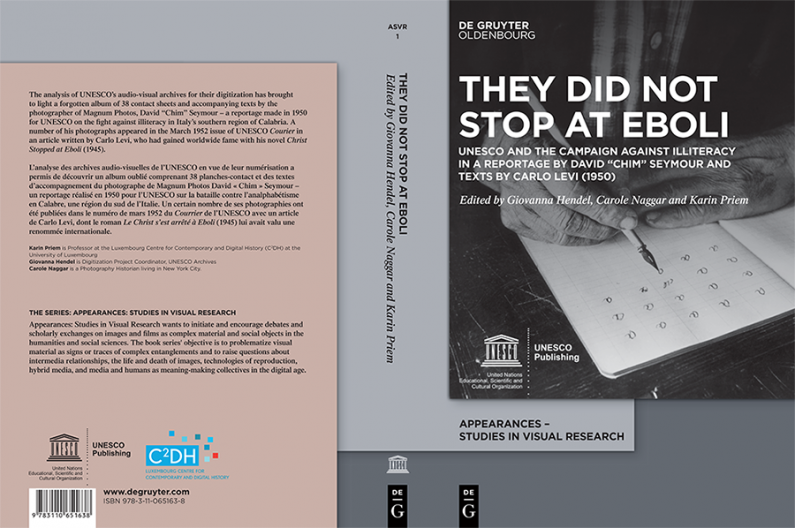The morning session will showcase highlights from the digital collections of the UNESCO Archives which resulted from the two-year pilot project Digitizing Our Shared UNESCO History, funded by UNESCO Member State Japan. In addition, members of the UNESCO Archives will outline future prospects for digitizing their archives and the vast amount of work that still needs to be accomplished.
The afternoon session will focus on a research and book project carried out collaboratively by the UNESCO Archives and the C²DH. The project, entitled They Did Not Stop at Eboli: UNESCO and the Campaign against Illiteracy in a Reportage by David “Chim” Seymour and Texts by Carlo Levi (1950), is not only a successful example of the benefits of the UNESCO digitization project; it also illustrates the historical importance of the UNESCO Archives. It is through joint projects with researchers that the UNESCO Archives can enhance their impact on research and their public outreach. They Did Not Stop at Eboli: UNESCO and the Campaign against Illiteracy in a Reportage by David “Chim” Seymour and Texts by Carlo Levi (1950) is the first open access volume in the series Appearances: Studies in Visual Research (De Gruyter) and also marks the start of a new UNESCO book series entitled UNESCO Archives: Treasures Within. The book will officially appear on 4 December.
Wednesday 4 December 2019
Room IX at the UNESCO Headquarters
7, place de Fontenoy
Paris
https://en.unesco.org/about-us/unesco-house
Programme
Morning Session: Digital Harvest and Future Challenges
| 9.45 |
Welcome and Introduction by Ingrid Regien (CIO/KMI) |
| 10.00 |
UNESCO Archives’ Digitization Programme by Adama Aly Pam (Chief Archivist/ALR) |
| 10.20 |
Overview of the Collections Digitized So Far by Adam Cowling (Project Manager of Phase 1 of Digitizing Our Shared UNESCO History) |
| 10.50 |
Coffee break |
| 11.10 |
Focus on the Selection of Digitized Recordings by Eng Sengsavang (Reference Archivist) |
| 11.30 |
Focus on the Selection of Digitized Films by Maëva Nguyen (Project Assistant of Phase 1 of Digitizing Our Shared UNESCO History) |
| 11.50 |
Discussion |
| 12.30 |
Lunch break |
Afternoon Session: Impact on Research and Successful Collaboration
| 14.00 |
Introduction to the Afternoon Session by Ingrid Regien (CIO/KMI) and Adama Aly Pam (Chief Archivist/ALR) |
| 14.10 |
Presentation of the Publication They Did not Stop at Eboli by the co-authors (in alphabetical order: Giovanna Hendel (UNESCO Archives), Juri Meda (University of Macerata), Carole Naggar (Independent Photography Historian), Karin Priem (C²DH, University of Luxembourg) |
| 14.30 |
Q&A |
| 14.50 |
Drawing on UNESCO’s Archival Sources to Research Literacy Campaigns in Latin America in the 1950s by Stefanie Kesteloot (C²DH, University of Luxembourg) |
| 15.10 |
Coffee break |
| 15.30 |
Shared Themes between Past and Present Educational Campaigns by UNESCO by Noah Sobe (Loyola University Chicago and Senior Project Officer at UNESCO) |
| 15.50 |
The Early Years of the Magnum Photos Cooperative and Humanist Photography by Clara Bouveresse (Université Paris 1 Panthéon-Sorbonne) |
| 16.10 |
Magnum Photos Archives & Magnum Photos Endowment Fund by Naïma Kaddour (Magnum Photos); Ana Cruz Yábar (Magnum Photos Endowment Fund) |
| 16.30 |
Round Table and Open Discussion |
| 17.00 |
End |



